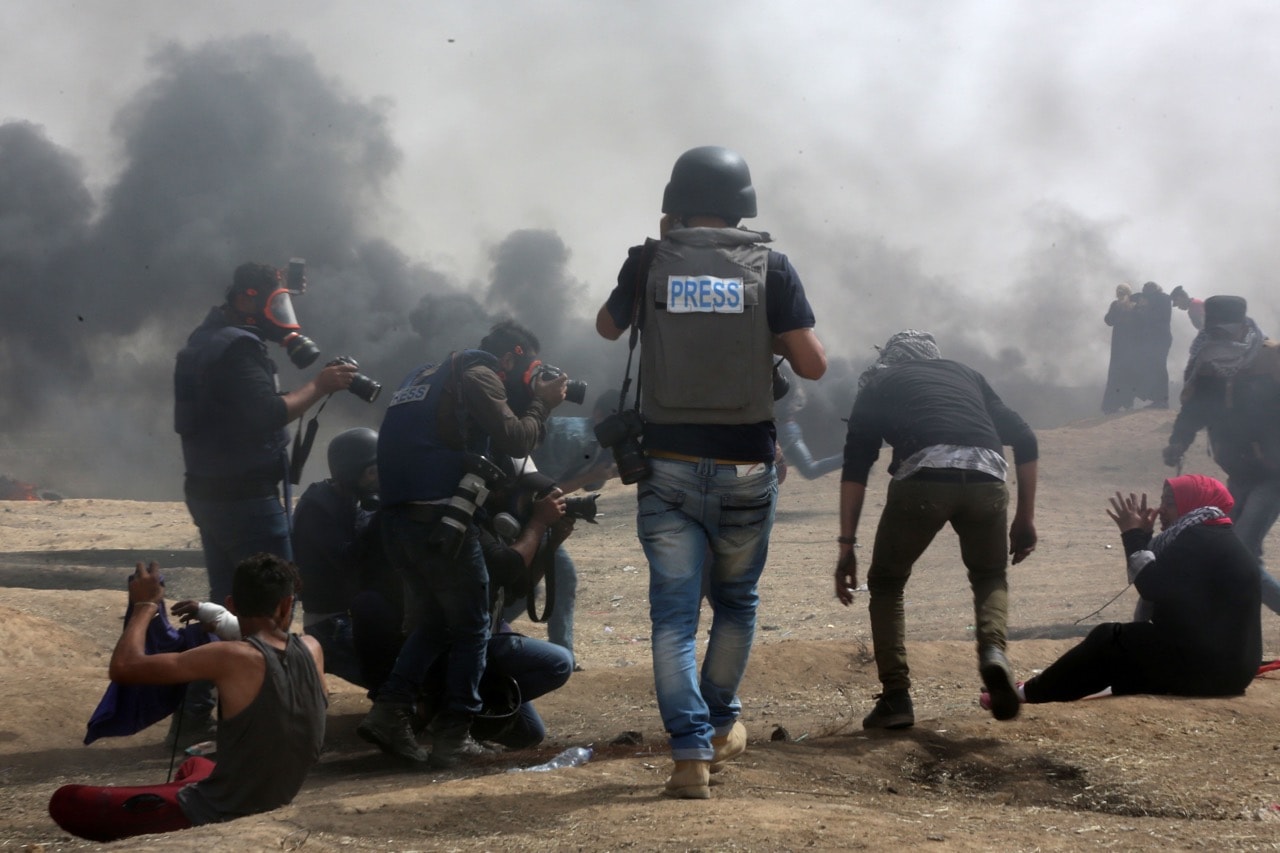A roundup of key free expression news in the Middle East and North Africa, based on IFEX member reports.
In Palestine, the ‘Great Return March’ in Gaza, which started on 30 March 2018 and is planned to continue until 15 May, was met with violence by Israeli troops. On 6 April, Palestinian journalist Yaser Murtaja was fatally shot at a protest which saw at least six journalists injured. Reporters Without Borders (RSF) condemmed the ‘disproportionate use of force by Israeli troops’ and called ‘for an independent investigation into this crime against press freedom.’ The Committee to Protect Journalists (CPJ) “condemned comments by Israel’s defense minister […] that appear to justify the killing of Palestinian journalist Yaser Murtaja in Gaza”. Meanwhile, the International Federation for Journalists (IFJ) joined its affiliate the Palestinian Journalists’ Syndicate (PJS) and also condemned “this inadmissible targeting of journalists and press freedom in Gaza”.
A second journalist, Ahmed Abu Hussein, shot while covering a protest on 13 April, died from his injuries on 25 April. Reacting to this state of affairs, CPJ Middle East and North Africa program coordinator Sherif Mansour said that “protective gear that clearly indicates individuals are members of the press should afford them extra protection – not make them targets.”
The Palestinian Center for Development and Media Freedoms (MADA) released a report documenting 46 violations against media freedoms in Gaza Strip and the West-Bank during March 2018.
On Palestinian Prisoners Day, marked annually on 17 April, the Cairo Institute for Human Rights Studies (CIHRS) expressed its full solidarity with the over 6,000 Palestinian prisoners currently in Israeli jails.
Dispatches
On 23 April it was announced that Egyptian photojournalist Mahmoud Abu Zeid, aka Shawkan, is the 2018 recipient of the 2018 UNESCO/Guillermo Cano Press Freedom Prize. The choice was especially significant as Shawkan, who has been in jail in Egypt since 14 August 2013, is reportedly facing the death penalty. The announcement came after the weeks-long #MyPicForShawkan campaign by RSF which “decided to launch this solidarity campaign on social networks because of the gravity of the situation.” The campaign calls on people to take part in the campaign “by posting photos with the hashtag #MyPicForShawkan on social networks posing as he did for a photo during a court appearance by miming the action of taking a photo.”
The prize will be awarded on 2 May 2018 on the occasion of World Press Freedom Day (WPFD).
Bahrain started its month in the shadow of Bahraini Interior Minister Lieutenant-General Sheikh Rashid bin Abdullah Al Khalifa’s announcement that security forces would “track down” activists for criticising the government on social media. The crime of ‘misusing social media’ had already led to five arrests on the same day. On 5 April, IFEX joined its members the Bahrain Center for Human Rights (BCHR) and the Gulf Centre for Human Rights (GCHR) to call for the release of Al-Khawaja, the co-founder of both organisations, as he faced his 7th anniversary behind bars. The day before, the Bahraini government denied entry to Lars Aslan Rasmussen, a Danish member of parliament, and to GCHR’s Brian Dooley, claiming that the two posed a “security risk.”
In Oman, the internal security forces have stepped up their crackdown on internet activists. The Omani Coalition for Human Rights, which consists of GCHR, the Omani Association for Human Rights, the Omani Center for Human Rights and Muwatin Center for Press Freedom, called for the release of internet activists Hassan Al-Basham and Yousif Sultan Al-Arimi. The coalition also called for the release of writer Abdullah Habib.
In the United Arab Emirates (UAE), GCHR reported that, after over a year of detention without trial, Emirati activist and member of GCHR’s Advisory Board Ahmed Mansoor had been taken to court. As there had been no news about him since September 2017, it came as a surprise to the organisation to hear that his trial “had already started in March” and that “the second hearing took place on 11 April 2018” – without the presence of a lawyer. On the anniversary of his arrest on 20 March, GCHR and over two dozen human rights NGOs had appealed for information on his whereabouts.
Gender and Free Expression
Across the Middle East and North Africa region, the campaign #NoLongerAlone launched by Human Rights Watch (HRW) and the Arab Foundation for Freedoms and Equality (AFE), in coordination with local activists and personalities, showed that “lesbian, gay, bisexual, and transgender activists from Arabic-speaking countries in the Middle East and North Africa are defying state-sponsored repression and social stigma.” The awareness campaign came in the form of a 75-page report entitled Audacity in Adversity: LGBT Activism in the Middle East and North Africa and a video series, entitled “No Longer Alone”. One gay activist from Algeria, Zoheir, said: “We don’t want the image anymore of just being victims. We want to speak about reality, speak about violence, but also to [show what is] positive.”
In Brief
GCHR reported that Iranian human rights activist and women’s rights activist Atena Daemi was beaten by agents of Iran’s Islamic Revolutionary Guards Corps (IRGC) and transferred to Gharchak prison.
As the crown prince of Saudi Arabia, Mohammed Bin Salman, was visiting France, RSF urged the French government to press him to release Raif Badawi, the recipient of RSF’s 2014 Press Freedom Prize, noting that “[a]t least 11 professional and non-professional journalists are serving jail sentences in Saudi Arabia.”
Social Media Exchange (SMEX), in an article entitled Now, Who’s Afraid of Online Speech? reported on a Tunisian bill “calling for certain types of online speech to be outlawed.”
